We live in a violent society. I think that’s as close to a truism as anything can be. Mass shootings are a fact of life in America, and they happen with a sickening regularity. Gun violence takes a very heavy toll, and violent crime has spiked since the pandemic – specifically, homicides over the course of 2020. It was, of course, a year of exceptions, though many pundits and prognosticators have claimed that the increase is largely the result of police going into a kind of defensive crouch in the wake of the murder of George Floyd and the subsequent uprising.
I’ve no doubt that police departments have pulled back. Some made a point of doing so after previous high-profile deaths of people of color in police custody. On the podcast Why Is This Happening?, Patrick Sharkey talks about the various factors behind this rise in violent crime. Less aggressive policing is one, but he makes the point that a lot of community-based services that contribute significantly to reducing crime were shut down during the pandemic.
This, in some ways, reflects the divide between right and left perspectives on how best to address crime. Not surprisingly to anyone who follows this blog, I come down on the left side of this question, and I do so with what I consider to be really good reasons.
Fighting Crime With Crime
The idea that, as a society, we should reduce crime by over-policing disadvantaged communities is cynical beyond belief. Yes, you can marginally depress crime by mass arresting people, throwing them in jail for long terms, harassing people of color, etc., but in so doing you do irreparable violence to entire communities. That in itself is criminal far beyond the level of anything you might hope to prevent.
Other approaches work better, frankly – mutual aid, community-based counseling and mentorship services, nutrition programs, housing support, direct aid to families and individuals, etc. They also build communities, not destroy them.
Dirty Harry Syndrome
The advocates for hyper-aggressive policing work to create the impression that cases like the murder of George Floyd are necessary by-products of the service police provide. Sure, goes the argument, occasionally someone gets killed who probably shouldn’t have died, but that’s the price you pay for having safe streets. Can’t make an omelet without breaking a few skulls … I mean, eggs, right?
There’s a visceral appeal to this argument – a kind of cathartic, give-them-what-they-deserve attitude that makes a lot of white people feel right with the world. There’s a reason why movies like Dirty Harry were big hits – it’s a very attractive narrative for people who don’t do a lot of thinking.
The Political Economy of Policing
Of course, we know that political careers are made on hyper-aggressive anti-crime politics. That’s true of everyone from your local DA to the President of the United States. It’s a lot easier to get taxpayers to pay for MRAPs and sophisticated weapons for the cops than it is to get them to fund after-school programs and free breakfast for kids of color. And even though aggressive policing is a bad solution to the problem of crime, it’s an easier sell for politicians than the much more effective and less destructive approach that involves supportive community services.
Let’s face it, there’s a lot of money in expanding the police/prison state, just like there was a lot of money in slavery. That’s why defund causes so much consternation – it hits them where it hurts. Very insightful on the part of BLM to work that out. We need to carry that knowledge with us as we seek real solutions to this dysfunctional system.
luv u,
jp


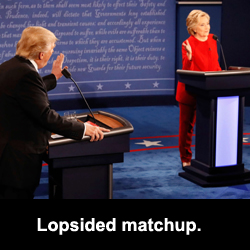 Not-so-great debate. I was witness to the nerve-wracking exchange between former secretary Clinton and Donald Trump, and I have to say that something about seeing the two of them on the stage of a presidential general election debate was disturbing enough even before they said anything. Clinton bested Trump, but that shouldn’t be hard. The guy literally knows nothing about anything. Honestly, the Republican party seems determined to convince people that there’s nothing to the presidency, that any dunce off the street can do the job. Count me among those who do not agree. That rambling wreck Trump would be a total disaster, to borrow one of his favorite turns of phrase. If Monday’s debate proved anything, it’s that.
Not-so-great debate. I was witness to the nerve-wracking exchange between former secretary Clinton and Donald Trump, and I have to say that something about seeing the two of them on the stage of a presidential general election debate was disturbing enough even before they said anything. Clinton bested Trump, but that shouldn’t be hard. The guy literally knows nothing about anything. Honestly, the Republican party seems determined to convince people that there’s nothing to the presidency, that any dunce off the street can do the job. Count me among those who do not agree. That rambling wreck Trump would be a total disaster, to borrow one of his favorite turns of phrase. If Monday’s debate proved anything, it’s that.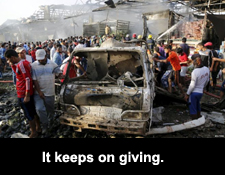 It was a week that started with the obscene bombing in Baghdad, the death toll for which has exceeded 250. As has long been the case, this provoked some small response in American culture because of the magnitude of the crime, but the degree of “hair-on-fire” apoplexy about terrorism has been relatively minimal due to the cultural distance between Iraq and the United States. As these attacks move closer culturally to the U.S., our politicians get more worked up. Forget this export we call “freedom” – that bombing is our gift to the Iraqi people and it just keeps on giving.
It was a week that started with the obscene bombing in Baghdad, the death toll for which has exceeded 250. As has long been the case, this provoked some small response in American culture because of the magnitude of the crime, but the degree of “hair-on-fire” apoplexy about terrorism has been relatively minimal due to the cultural distance between Iraq and the United States. As these attacks move closer culturally to the U.S., our politicians get more worked up. Forget this export we call “freedom” – that bombing is our gift to the Iraqi people and it just keeps on giving.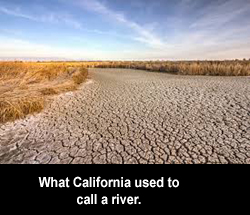 And yet, here we are, faced with enormous challenges, decades – even centuries – in the making. Problems like climate change, a matter so enormous most of us just turn away. For those of us who believe the overwhelming scientific consensus there is a human role in climate change, far too many feel that this is something that can be solved by driving a Prius and screwing in a few LED light bulbs. Those are good things, but this is not the type of challenge that is going to yield to small-bore actions carried out at a personal level. This will take a major reshaping of our economy, our use of resources, our entire approach to the Earth. Half measures won’t do it.
And yet, here we are, faced with enormous challenges, decades – even centuries – in the making. Problems like climate change, a matter so enormous most of us just turn away. For those of us who believe the overwhelming scientific consensus there is a human role in climate change, far too many feel that this is something that can be solved by driving a Prius and screwing in a few LED light bulbs. Those are good things, but this is not the type of challenge that is going to yield to small-bore actions carried out at a personal level. This will take a major reshaping of our economy, our use of resources, our entire approach to the Earth. Half measures won’t do it.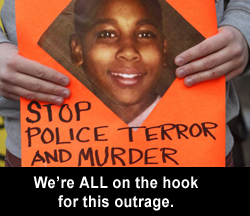 This is, however, an issue that isn’t going to be solved through police reform. Yes, dialing back police tactics is a necessary component, but it is just one element in a far more complex picture. Black Americans have been treated like shit since emancipation (prior to that as well, of course). Black life has been criminalized nine ways from Friday, starting with the virtual enslavement of African Americans in the post-reconstruction era (as chronicled by Douglas Blackmon in
This is, however, an issue that isn’t going to be solved through police reform. Yes, dialing back police tactics is a necessary component, but it is just one element in a far more complex picture. Black Americans have been treated like shit since emancipation (prior to that as well, of course). Black life has been criminalized nine ways from Friday, starting with the virtual enslavement of African Americans in the post-reconstruction era (as chronicled by Douglas Blackmon in 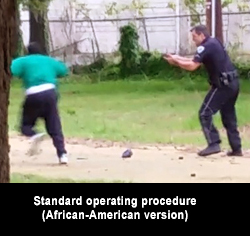 Of course, the North Charleston Police Department would likely have stuck to the police officer’s original story if the video hadn’t surfaced; that Scott had grabbed the officer’s taser, that he had posed a threat to the officer’s life, that the cops had administered CPR in some kind of timely fashion. Feidin Santana’s video put the lie to all of that, and in so doing, threw into question every official claim of following proper police procedures. Those initial reports sounded like what we heard after Michael Brown’s shooting. But then, so did the web cam video that captured the police killing of 12-year-old Tamir Rice. Has anyone gone to jail over that? Not yet.
Of course, the North Charleston Police Department would likely have stuck to the police officer’s original story if the video hadn’t surfaced; that Scott had grabbed the officer’s taser, that he had posed a threat to the officer’s life, that the cops had administered CPR in some kind of timely fashion. Feidin Santana’s video put the lie to all of that, and in so doing, threw into question every official claim of following proper police procedures. Those initial reports sounded like what we heard after Michael Brown’s shooting. But then, so did the web cam video that captured the police killing of 12-year-old Tamir Rice. Has anyone gone to jail over that? Not yet.